ARTICLE WRITTEN BY THE UK DAILY MAIL.
My mother told me: ‘I have wasted 16 years raising you’
One week after my 16th birthday, my mother informed me she was leaving me and my father. They had a turbulent relationship and although she had threatened to go numerous times, I never thought she’d do it.
But when I arrived home from my Saturday job the next day, the house was empty — she had taken her precious face creams, china and pictures with her.
In her wardrobe, the hangers lay bare and motionless. Her shoes no longer lined the bottom shelves.
My body went into shock. I felt extinguished, as if my own life had evaporated into thin air.
She hadn’t disappeared completely, however. I knew exactly where she was. She had simply followed through on her threat and abandoned us for a life with three young male lodgers, living in the house she’d secretly bought next door.
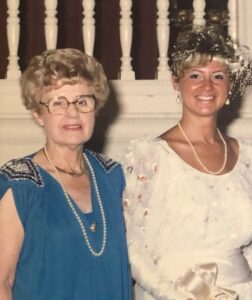
That afternoon, I plucked up the courage to walk from our home, No 49, with its white stucco walls and baby-blue door, to No 47, which was cream-coloured and had a green door. Her new home.
I stood outside both houses for a moment, looking back and forth between them. Two houses, two doors, two parents . . . and one me. I felt scared and alone as I rang the bell.
Mum opened her door formally, as if she were expecting the Queen over for tea — no affection, no expression, and absolutely no guilt. When I asked her what was happening, she sighed and said: ‘Diane, I’ve given you and your father 16 years of my life and I’m done. You’re big and ugly enough to take care of yourself.’
She added: ‘I’m not asking you to choose. I’ve made the decision for you. I’m not taking you. I’m leaving you with your dad.’ This distressed me. Wasn’t a mother supposed to take her child if she left?
‘How did Dad take it?’ I asked, in misery and disbelief. ‘Who’s going to tell him?’
For a second, her swagger wavered. ‘You are,’ she replied.
She hadn’t even bothered to tell him. This smart, self-centred, narcissistic coward expected me to break the news to my own father.
Mum had planned her departure meticulously. A few years earlier she had sold the West London house she had been renting out and, without telling Dad, bought the house next door to us, ostensibly as an investment, negotiating a contract with a local college to rent out the rooms to students.
Now, she had the independence and freedom she’d been craving and none of the boring drudgery of marriage or motherhood.
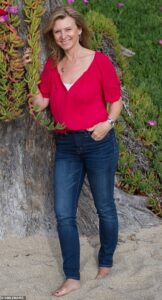
That day, I solemnly vowed never to do to my future children what my mother had done to me. But then, decades later, when my own daughter turned 16, I found myself standing in my mother’s shoes — and I realised there were worrying parallels.
My parents’ marriage had been one of convenience or, rather, inconvenience, when I came along by accident.
Mum, whose name was Mary, was 44 and dating my dad, Lou, who was then 60, when she became pregnant. When the doctor told her she was expecting, she assumed it was some mischievous prank cooked up by Lou and the GP, a pal of his.
A recently divorced Catholic woman, she already had two children from her first marriage, then 18 and 14, while he was the widowed father of a 14-year-old.
This fiercely independent woman didn’t want to be tied down by yet another child, but it was 1959 and there was no other solution. They hastily married and got on with bringing me up.
She left Dad and me to live in the house she’d bought next door
We were a comfortably-off, middle-class family, enjoying holidays on the Continent twice a year. Dad was a self-employed business owner who had at one time been in line to be the mayor of Ealing, in London.
When I was five, we moved to the suburbs. Isleworth was idyllic to me, but Mum was miserable, having been plucked from her network of friends, family, and the world she knew.
To make matters much worse, Dad, a traditionalist, had forbidden her to work. A working wife was a black mark against his name. But my mother had already raised two kids and had enjoyed a busy life of working in a members’ bar, managing a newsagent, and acting as landlord to her various properties. Now she felt her spirit was being crushed.
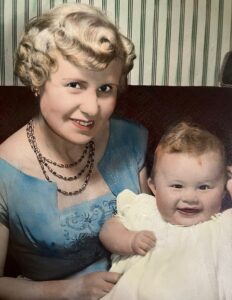
Her courage had given her the strength to leave Ireland in the 1930s, when she was just 16, to start a new life in England alone. And she again found that same strength to unapologetically leave her first husband in the 1950s, against the beliefs of her Catholic Church.
Railing against the constraints of her second marriage, she frequently lashed out. I remember a lot of ‘God help me’ and ‘Jesus, Mary and Joseph’. The words ‘depressed’ and ‘menopause’ weren’t bandied about the way they are now, so no one understood her mood swings.
She loved to work — it gave her a sense of fulfilment and interaction with other people. And, worse, she felt Dad didn’t appreciate her.
So, when I was 16 and she was 60, her identity in a spiral and her situation not helped by a narcissistic personality, she did the only thing she felt she could: she walked away.
This felt horribly familiar, but something inside me was missing
Because she’d left her own childhood home when she was 16, to her mind I was a grown woman at that age. She refused to see that I was an innocent child and totally unprepared for life without her.
Divorce was comparatively rare in the UK, and there were no counsellors at school to help. I kept my abandonment a secret from even my closest friends, compartmentalising my life: school and school friends were my normal, and my best friend’s home was my refuge.
Sport and dance were my salvation, enabling me to release the pain and stress.
Thankfully, Dad, then 77, was loving and caring. For the next few years, we lived at No 49 with me running the home, sorting the laundry and cooking his meals. I dutifully dropped in on Mum most days after school.
Mum presented the arrangement — which suited her, and only her — as a perfectly natural way to live.
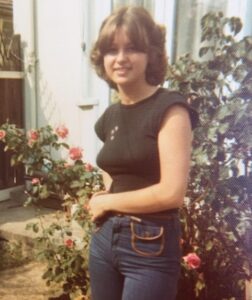
I’d often find her in her new kitchen preparing food, wearing her favourite pinny, vegetables ready to boil for the lodgers, and a cake tin on the counter. I would be served a cocktail of humiliation and hurt as my mother jested and jousted with the lads.
She was a 4 ft 11 in Irish pistol, who could cut you in two with a lash of her tongue — and then in the next breath, charm you with her hospitality.
Mum loved to be the centre of attention and she was getting far more attention at No 47 than she ever had at home. She treated those boys like nephews or young sons, taking care of them without a shred of remorse.
At least having the boys around added levity to my visits. Mum never got into a foul mood if there was company. But her ambivalence towards the situation she’d put me in made me feel neglected, inconsequential.
My occasional outbursts (‘I don’t know how to run a house! How am I ever going to have time to do my homework, or see my friends?’) were ignored. Mum let me flounder. There was never any acknowledgment or acceptance of her wrongdoing.
On one visit, she laid into me: ‘I’ve wasted 16 years raising you, doing everything for you, and being married to that ungrateful b******.’
With every ounce of energy I could rally, I challenged her: ‘In other words, what you’re really trying to say, Mother, is that I ruined your life, and you wish I was never born?’
‘Yes, it would have been better if you weren’t,’ she countered.
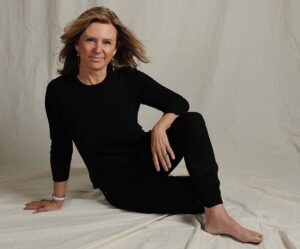
At that sledgehammer blow, the emotions I’d worked so hard to control since her departure flooded out. I felt valueless to her.
Looking at photos of me from that time, there is an unbearable sadness in my eyes.
Over the years, my mother’s behaviour became increasingly erratic: one moment a love bomb, saving me when I was in debt, the next making grand promises she’d retract without explanation.
I was 23 when my father died, and Mum encouraged me to stay living next door, although overpowering memories of him (I even thought I saw his ghost) forced me to leave.
Finally, at the age of 27, I moved to America to take up a role with an advertising agency in the Saatchi & Saatchi group. It was my fresh start far from the past and Mum’s shenanigans.
She was thrilled. It was all she had wanted — I was having the career she’d wanted for herself.
Perhaps not surprisingly, I had no intentions of becoming a mother myself. I was delighted to be running free from all the family responsibility I’d felt so burdened by during my teens. My mother had left because she felt constrained by motherhood and I never wanted to feel that way.
Then, in my late 20s, I became seduced by the idea of ‘having it all’. Surely I could continue my career as senior vice president of an advertising agency and employ nannies to help with my children?
I married Bill at 32 and our daughter, Natalie, was born a year later. But I returned to work when she was just three months old and realised with shock and clarity that I didn’t want to be that kind of mother. So I quit.
However, being a full-time mum was hard. When Natalie was a year old, I was approached to go back to work and I agreed to return as a consultant, provided I could be home to enjoy dinner with my children and put them to bed (Natalie’s brother, Nick, came along three-and-a-half years later).
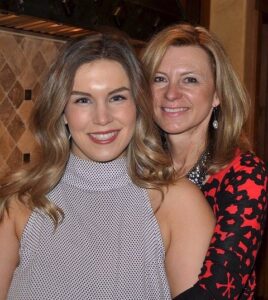
I’d been living in America for more than 15 years when I flew back with my children to see Mum. On that visit, however, I managed to anger her by staying with my half-sister from her first marriage, from whom she was bitterly estranged, so she retaliated by telling me that Lou, the man I had always known and loved as Dad, might not be my father after all.
It was the last straw and it spurred me to see a therapist.
That was the first time I heard the words: ‘What your mother did was wrong. You don’t need to make excuses for her any more.’
When Natalie was close to the age I was when Mum left, and I was in my late-40s, I went through a crisis myself. I started asking: ‘Who am I?’ I’d built my life around my family and now I found myself wondering where that fearless career woman had gone.
It all seemed so horribly familiar. Now, I too felt as if something inside me was missing, and I had to find a way to spread my wings again — without throwing my children out in the process.
Bill and I seemed to be going in different directions. We tried living separately, with Bill in a house around the corner but working as a family and getting together for holidays and family events. The irony of this unconventional living arrangement is not lost on me.
I was very much in danger of repeating my mother’s pattern, and that worried me deeply.
The only way to move forwards was to try to forgive my mother for what she’d done. So, I went back to the UK and talked to my sister and friends about what had really happened when I was 16. I decided I would share my story — the heartbreak, madness, love and hate — in a book.
Plumbing the depths of my trauma and writing this story has enabled me to feel new-found gratitude, understanding and even, though this may be surprising, admiration for my mother.
She’d had a tough life, and, ultimately, her behaviour toughened me up for the world, instilling in me the courage and ambition that set me on the path to a successful career.
I can’t change what she did, but I can take the good from it and live my life as best I can. The truth is, love is messy, but it is all that matters: the last words my mother said to me before she died were the ones I’d always needed to hear: ‘I love you Diane, I always have.’
Bill and I are happily back under the same roof and I am extremely close with my children. Natalie, now 28, and I have huge fun recording a podcast together, called Mothers & Daughters Unfiltered.
Writing about my experiences as a teenager and trying to understand how my mother became ‘the woman next door’ has given me a greater capacity for empathy, love and, yes, even forgiveness.
Adapted by LOUISE ATKINSON from My Mother Next Door by Diane Danvers Simmons.
To access the article, click here.

